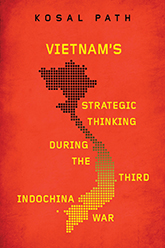|
Vietnam's Strategic Thinking during the Third Indochina War
Kosal Path
New Perspectives in Southeast Asian Studies
Series Editors: Alfred W. McCoy, Ian G. Baird, Katherine A. Bowie, and Anne Ruth Hansen
“Path fundamentally recasts several key episodes in the history of the Socialist Republic of Vietnam. This book not only contributes to our empirical understanding of these events; it also engages with recent political science scholarship, offering vital insights in response to claims of ideological influence and Sinocentric logic.”
—Bradley Davis, author Imperial Bandits: Outlaws and Rebels in the China-Vietnam Borderlands
A revealing political history
Vietnam’s Strategic Thinking during the Third Indochina War explores why the nation’s leadership first decided to invade Cambodia in 1978, then shifted its approach from military confrontation to economic reform in the late 1980s. Drawing on previously inaccessible internal reports and primary sources, Kosal Path argues that Hanoi’s leaders made rational domestic and foreign policy decisions in the face of changing information and the waxing and waning of competing factions within the government.
When costly efforts to cement a strategic partnership with the Soviet Union failed, the combined political pressure of economic crisis at home and imminent external threats posed by a Sino-Cambodian alliance compelled Hanoi to reverse course. Moving away from the Marxist-Leninist ideology that had prevailed during the last decade of the Cold War era, the Vietnamese government implemented broad doi moi (“renovation”) reforms intended to create a peaceful regional environment for the country’s integration into the global economy.
In contrast to earlier studies, Path traces the moving target of these changing policy priorities, providing a vital addition to existing scholarship on asymmetric wartime decision-making and alliance formation among small states. The result uncovers how this critical period had lasting implications for the ways Vietnam continues to conduct itself on the global stage.
Kosal Path is an assistant professor of political science and chair of the Master’s Program in International Affairs and Global Justice at Brooklyn College, the City University of New York.
Praise
“Path relates a story that is both meaningful and engrossing. It is also highly authoritative. I have worked in Vietnamese archives for over twenty years; the quality of the materials the author obtained is nothing less than extraordinary.”
—Pierre Asselin, San Diego State University
“The first academic monograph in any language dedicated to telling the story of the Third Indochina War from the Vietnamese perspective using predominantly Vietnamese archival sources. . . . It will be required reading for scholars of Vietnamese, regional, and global Cold War diplomatic history and international relations for years to come. . . . An immense contribution.”
—Journal of Vietnamese Studies
“A pioneering and targeted study of the conflict covering the period from 1975 to 1986. . . . Path’s book makes a significant contribution to the historiography of the Third Indochina War. It is currently the most detailed account of the decision-making leading to the Vietnamese invasion of Cambodia in 1978, the impact of the war on Vietnam (as well as on Cambodia) and the context of the Doi Moi policy from the Vietnamese perspective.”
—Contemporary Southeast Asia
Also in the Series
|

In Plain Sight
Impunity and Human Rights in Thailand
Tyrell Haberkorn |
|

Larger images
New in Paperback!
July 2023
LC: 2019017148 DS
308 pp. 6 x 9
5 b/w photos
|

